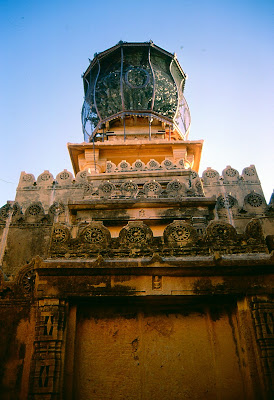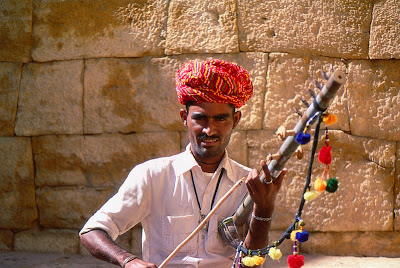Clearly Grace and I had been a hit with Hari. We had listened to his music and we had even been invited to his home. We were practically family. As a result he latched on to us as soon as he saw us. He was a nice guy but he kept pestering me for a souvenir in particular he wanted my watch. It wasn't a very fancy watch, a Tissot I had been given for my 30th birthday. It wouldn't have been a very long lasting souvenir either because it doesn't work now. I didn't give it to him but I did give him some money. Not very much, just over £1 in fact. I was on a budget but all the same it doesn't seem like enough now. It might have amounted to a day's pay or even more but it was still only about a £1. I feel cheap. Then again Hari seemed happy enough. Life is cheap in India.
At some point during the meanderings of this day, nothing very much of which seemed to have been noteworthy, I am sure that I visited the local Bhang shop. I must have because there is a photograph taken by Grace.

This was another thing that I didn't do properly. Bhang is legal. You can buy it in "ahthorised" shops like this one or even "authorised" ones. The way it is supposed to be taken is in the form of a drink like a bhang lassi or in the form of sweets. I knew that. The problem is that I am extremely wary about ingesting drugs. It all stems from an experience on the best ever trip before the trip I am describing here.
That trip was with my mate Brendan and was the forerunner of the Big Trip - The Interail Trip. It's what people used to do before worldwide international traveling became easier. I can't go into it here but it was a great experience and somehow, looking back, a sort of Big Trip training exercise. The itinerary began and ended Amsterdam. I am trying my best to remember whether the experience came at the beginning or the end. I think it must have been the end because it was on my birthday that it happened. Having conquered Europe Brendan and I returned to Amsterdam and set up our tent on the famous Vliegenbos camp site across the river from Centraalstation and then immediately made our way to the Koffiehop "Rusland" where they sell traditional dutch style Koffie (coffee) and a wide selection excellent teas. As well traveled aficionados of coffee and natural born tea drinkers this was obviously the place for us. Not only that but they also were also noted purveyors of finest quality hashish from the orient.

I digress here. Those were the days when to my mind 'potsmoking', as my mother once quaintly called it, seemed to be a good deal more organic than it is these days. The stuff available was honest-to-goodness dope. You could get, inter alia, Maroc "Sputnik", Maroc "Zero-Zero', soft Afghan Black, Lebanese blonde and real original strains of herbal cannabis from, say, Thailand. Whatever you got, was good quality and apparently unadulterated and, what's more, it was possible to smoke a joint without becoming completely wasted. These days, it seems to me (not that I am making any admissions of any kind) that the varieties of hashish available in Amsterdam are all so strong that sometimes the experience is not of euphoria but heightened edginess. Roll on the day of enlightenment when the weed is freed. There has got to be a market for "Real Pot" in much the same way as there is for "Real Ale". A cool koffieshop selling old fashioned, hand crafted, genuine cannabis products to ageing hippies would go a bomb.
Anyway, the Rusland was also famous for it's confectionery. In particular cake. More particularly "Space Cake".

So there we were in the Rusland at the bar where a small amount of something or other to fortify a cigarette was purchased. While there Brendan asked the girl behind the bar about the Space Cake. Having established it was affordable he asked for a slice. The girl positioned the knife to cut a slice and Brendan explained that the cake was for me because it was my birthday the following day. The girl smiled broadly and changed her cutting angle and cut a bigger slice than she might have done. As she put it in a bag she gave me a knowing smile and wished me a very happy birthday.
The next day dawned on the campsite. Brendan and I woke up in our sleeping bags in the tent that had seen good service in Venice, Florence, the Ionian Islands and Rome. It was my birthday! And what better way to start the day than with a huge number created using some novelty cigarette paper which came on a roll? We boiled up some water for a cup of tea and then began to feel peckish. We had nothing to eat except my Birthday Cake! Brilliant! We shared the cake but it is fair to say that I had the lion's share of it. This was not because I am greedy but because Brendan didn't want that much and it would have been a shame to waste it.
We just about kept it together long enough to leave the campsite and head across the river before (in a Dr Hunter S Thompson stylie) the cake began to take a hold. By the time we reached Centraalstation I was a mess.
The plan was to go to the VVV office outside the station and book tickets for a concert the following night at the Concertgebouw (something by Handel or Haydn conducted by Bernard Haitinck) . We got there but by this time I could hardly speak so Brendan had to make the booking when we got to the front of the queue. The helpful guy then picked up the phone and dialled the concert hall Box Office. It was busy so he hung up and dialed again. The line was still busy. He instantly cut the line and redialed. The line was still busy. He tried again and again and again and again. By this time I was becoming distressed. I couldn't stand in the place and watch the man just redial, hang up and redial over and over again. It was becoming too much to handle. It seemed to go on for hours like we were stuck in some kind of loop. We couldn't leave because the guy hadn't got through but it seemed like he never would.
Of course it wasn't completely unbearable but I did feel terrible. I felt as if all the blood had drained from me and I was extremely unsteady. I just wanted to get out of there. The place was probably full of fresh faced, clean living teenagers from all over Europe booking excursions, rondvaarts, making hotel reservations and getting information. I was oblivious to their presence by they probably weren't oblivious to the fact that there was a cream faced loon in the room who looked very much the worse for something or other.
The guy did eventually get through and we got our tickets. After that all I can remember is following Brendan up the Damrak towards Dam Square. It was a much seedier place then than it is now. You couldn't cross the the square without some (usually black) guy sidling up and whispering "Hashish! Hashish!" (as if I needed any and as if if it wasn't widely available). Wherever Brendan went I was stumbling two steps behind. If he stood in a puddle, I stood in a puddle. If he didn't, I did anyway. I was a shambolic figure.
This state of semi-consciousness just went on and on and wave after wave of the effects of the cake washed over me. I genuinely have no proper recollection of what I was doing. I was only glad Brendan hadn't eaten as much cake as I had because if both of us had been in my state God only knows what would have become of us. We did go to the Rijksmuseum but I can't recall very much at all except standing in front of the Nightwatch by Rembrandt which I could only recall as being very dark.
I don't know when I came round and started to straighten up. We did go to the Concertgebouw the next day which was great but somehow Brendan lost his wallet.
The problem with ingesting drugs is that once you have done it there is no way of undoing it. If you eat too much you don't find out until its too late and there's no way to turn it off.
So I was very wary of eating bhang sweets or drinking bhang lassi. In the right company (or the wrong company depending on your point of view) I might have tried it but in the company of Grace, Imogen and Mandy it didn't seem like a very good idea. I did, as the picture above shows, buy a bag of dry bhang which I smoked that night on the roof of the hotel in large neat joints. It wasn't very effective.
At some point during the day I also picked up some souvenir chillums. These are pictured below. I also purchased a very fine elephant sculpture which I will photograph and add to the next posting.

Dinner that night was at the Hotel Trio again where there was more Rajasthani music and this time dancing too. Then, as I have said, we repaired to roof of the hotel for another night under the stars trying in vain to get high on neat bhang joints.


























